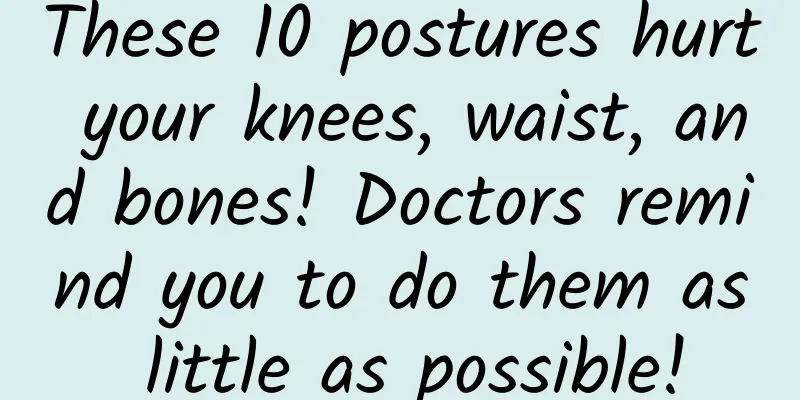These 10 postures hurt your knees, waist, and bones! Doctors remind you to do them as little as possible!

|
In daily life, many of our actions or habits can cause damage to the lumbar spine and knees. In particular, you can check the following 10 postures and make sure to correct them in time if they are incorrect! 01 Squatting The pressure on the knees when squatting is much greater than that when standing. Studies have shown that the weight on the knees when lying flat is almost zero, while the weight on the knees when standing up and walking is 1-2 times the body weight, 4 times when running, and 8 times when squatting and kneeling. Recommendation: The elderly and obese people should avoid squatting as much as possible, or reduce the squatting time to no more than 20 minutes. It is best for the elderly to hold on to a table or chair when squatting to reduce the pressure on the knee joints. 02 Lying on the sofa Lying on the sofa or bed watching TV or playing with your phone is very hard on your bones. When in a semi-recumbent position, the lumbar spine lacks sufficient support, and the original curvature is forced to change and bend forward, increasing the gravity on the intervertebral disc, which can lead to damage to the lumbar intervertebral disc and scoliosis over time. Recommendation: It is best to choose a sofa with a harder texture so that you won’t sink into it all of a sudden when you sit on it. It is best to add a pillow behind your waist when resting to support your lower back and help relax your lumbar spine. Copyright image, no permission to reprint 03 Shoulder bag Long-term use of a shoulder bag may cause uneven shoulders. Uneven shoulders are not just uneven shoulders. Long-term use of this method may also cause the pelvis to rotate, which may further lead to longer and shorter legs. It may also cause scoliosis. Especially during adolescence, long-term use of a shoulder bag may cause scoliosis to a large extent, which is caused by muscle imbalance. Recommendation: If the journey is long, it is best to carry a backpack. 04 Cross your legs Always crossing your legs will limit the blood flow to one leg. The weight of the upper body will be placed on one leg, causing long-term pressure on the pelvis and hip joints, which can easily lead to soreness and muscle strain. It can also cause uneven pressure on the lumbar and thoracic vertebrae, cause spinal deformation, induce lumbar disc herniation, and lead to chronic low back pain. Suggestion: Maintain a correct sitting posture and try not to cross your legs. If you can't change it immediately, don't cross your legs for more than 10 minutes at a time. 05 Standing for long periods of time Some people stand for a long time due to habit or work. When standing, the lumbar spine, hip joint, knee joint and ankle joint will be under great pressure, and problems with the lumbar spine and lower limb joints will occur in the long run. Suggestion: Maintain a correct standing posture, with your chest up, head up, and arms hanging naturally, so that the weight of your body is evenly distributed on your legs. After standing for half an hour, walk around, sit and lie down. Copyright image, no permission to reprint 06 Looking down at the phone When you lower your head to use your phone, your cervical spine bears a heavier weight of your head, your shoulders and neck are overly tense, and your lumbar spine is burdened. Once you become a "head-down tribe", you will suffer from shoulder and neck muscle pain, back pain, cervical spondylosis, etc. in just a few years. Recommendation: Do not look down at your phone for more than 15 minutes. The phone should be at eye level or slightly lower, and your head should be upright without hunching your back. 07 Poor sitting posture Long-term poor sitting posture or staying in front of the computer for a long time can easily cause cervical muscle fatigue and cause cervical problems such as neck and shoulder pain. Suggestion: The correct sitting posture should be to keep your upper body straight, abdomen tucked in, jaw slightly retracted, lower limbs together, and lower back as close to the chair back as possible to reduce the pressure on your waist. 08 Holding the phone between head and shoulders Some people hold their cell phones between their shoulders and ears, tilting their heads to talk on the phone while working. Excessive force on the cervical spine to one side may cause neck muscle spasms and excessive fatigue, resulting in neck soreness and pain, and burying the hidden dangers of cervical spondylosis. Recommendation: It is best to hold the phone when answering the phone, and alternate hands every few minutes to avoid excessive tension in the muscles on one side. Copyright image, no permission to reprint 09 Sleeping on your stomach When you sleep on the table, you will find that your hands and feet are numb, your head is swollen, and your face is marked with marks when you wake up. People with back pain or neck pain should not sleep on their stomachs. The cervical spine maintains a physiological curvature, which may cause cervical problems and aggravate the condition. Recommendation: It is best to lie down for a nap. If conditions do not allow, you can sit on a chair, put a cushion behind your waist, lean back slightly, and simply rest for a while. 10 Lift heavy objects with straight knees and bent waist "Slipped waist" is also called acute lumbar sprain. When you straighten your knees and bend over to lift heavy objects, you cannot effectively exert the strength of the muscles around the hip and knee joints. The fascia, muscles, and ligaments of the waist and back are often injured due to excessive burden, which is also harmful to the lumbar spine. Suggestions: When lifting heavy objects, bend your knees and squat, keep the object as close to your body as possible, keep your spine vertical, use your legs to support your body and stand up slowly, and avoid sudden force. After a slipped waist, it is best to rest on a hard bed, and you can cooperate with massage, acupuncture and other treatments. Source: Health Times The cover image and the images in this article are from the copyright library Reproduction of image content is not authorized |
<<: Acne, hirsutism - beware of polycystic ovary syndrome
>>: You must have tried this "strongest peripheral" of "Man Jiang Hong"!
Recommend
Why should I check my vaginal discharge at 37 weeks?
Many women think that discharge is harmless, as l...
How to help a cat with dystocia? How to know if a cat has dystocia?
Cats are viviparous animals. When a cat gives bir...
What should I do if I want to have sex during my period?
Menstruation is a woman's physiological perio...
I feel bad after giving birth and always want to cry
In addition to some physical conditions, some pre...
24 hours before a woman "splits in two"
Follow "Body Code Decoding Bureau" (pub...
Female hair growth
I believe that no one in life wants to have too m...
How to make your breasts smaller
In our lives, many people do breast augmentation ...
What fish is good to catch during Jingzhe? What are the fishing techniques during Jingzhe?
After the "Qingzhe", the fish become mo...
Is the uterus enlarged?
Under normal circumstances, a woman's uterus ...
What causes genital bone pain?
Bone pain on both sides of the genitals is genera...
What to eat when menstruation is too long?
Recently, many female friends have experienced me...
Why does the scenic spot allow pigs to bungee jump?
On January 18, 2020, a golden pig bungee jumping ...
The reason why women are healthier if they touch their breasts more
I believe everyone knows the importance of breast...
To prevent tooth decay, success or failure lies in the details. Have you done them well?
Although people's awareness of self-care is i...
What are the targeted drugs for cervical cancer?
Cervical cancer is the most common gynecological ...









